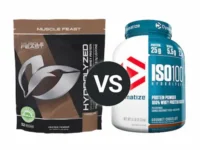Knowledge BaseYou're Questions Answered
Can whey protein cause headaches?
While whey protein is generally safe and beneficial for most individuals, some people may experience headaches as a potential side effect. This reaction can vary depending on individual sensitivities and the quality of the whey protein consumed.
Headaches from whey protein are not typically a direct symptom caused by whey itself but may result from several indirect factors:
- Artificial Sweeteners: Many whey protein products contain artificial sweeteners like aspartame or sucralose, which can trigger headaches in some individuals (1).
- Lactose Intolerance: Whey protein, especially if not isolate, contains lactose, which can cause headaches in lactose-intolerant individuals due to the onset of gastrointestinal symptoms that include nausea and bloating (2).
- Additives and Preservatives: Certain additives and preservatives found in some protein powders might contribute to headaches. These substances can sometimes cause adverse reactions including headaches, especially in people who are sensitive to these chemicals (3).
It is also possible for headaches to occur as part of an allergic reaction to whey. If you have an allergy to cow's milk, consuming whey protein can trigger a range of allergic symptoms, including headaches, hives, and difficulty breathing (4). If you experience persistent headaches after consuming whey protein, it is important to consider these potential causes and adjust your intake accordingly. Trying a whey protein isolate, which is more refined and contains less lactose and fat than whey concentrate, may help alleviate symptoms.
To minimize the risk of headaches, opt for whey protein that is low in additives and artificial sweeteners and consider consulting with a healthcare provider to rule out any allergies or intolerances. Additionally, maintaining adequate hydration when consuming protein powders can also help mitigate headache symptoms as dehydration is a common headache trigger (5).
- Shapiro, R. E., & Hurley, R. A. (2011). Migraine and the Environment. Headache: The Journal of Head and Face Pain, 51(6), 941-955.
- Suarez, F. L., Savaiano, D., & Levitt, M. D. (1995). A comparison of symptoms after the consumption of milk or lactose-hydrolyzed milk by people with self-reported severe lactose intolerance. New England Journal of Medicine, 333(1), 1-4.
- Vlieg-Boerstra, B. J., van der Heide, S., Oude Elberink, J. N., Kukler, J., Becker, W. M., Jansen, H. M., & Dubois, A. E. (2007). Placebo reactions in double-blind, placebo-controlled food challenges in children. Allergy, 62(8), 905-912.
- Rona, R. J., Keil, T., Summers, C., Gislason, D., Zuidmeer, L., Sodergren, E., ... & Madsen, C. (2007). The prevalence of food allergy: A meta-analysis. Journal of Allergy and Clinical Immunology, 120(3), 638-646.
- Popkin, B. M., D'Anci, K. E., & Rosenberg, I. H. (2010). Water, hydration, and health. Nutrition Reviews, 68(8), 439-458.
Related Questions

Your Answer
We are a participant in the Amazon Services LLC Associates Program, an affiliate advertising program designed to provide a means for us to earn fees by linking to Amazon.com and affiliated sites.






